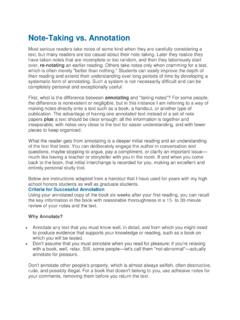Transcription of Busting the Icon - clausewitz.com
1 Strategic Studies Quarterly Fall 2007[ 116 ] Busting the IconRestoring Balance to the Influence of ClausewitzPhillip S. MeilingerIf you train a man for war alone you are automatically training him for murder; but if you claim, in all sincerity, that you are training him to preserve peace you must train him to be a human being. Col-Gen Klaus Kahlenberge1 Many US military thinkers and practitioners have embraced a view of war that is out of touch with current circumstances and, consequently, dan-gerous. This has a direct effect on the present global war on terror that is focused largely on Islamic extremists. There are two main problems. First, US military leaders especially in the ground forces continue to view war as a climactic, and usually bloody, clash of arms. Muddy boots and bloody bayonets and occupation of territory are the liturgies of these people, a maxim that current operations in Iraq against Muslim terrorists have shown to be increasingly bankrupt.
2 In addition, the American military is culturally tone deaf. It does not sufficiently take into account the funda-mentally distinct traditions, mores, behaviors, and beliefs of the people that we deal with around the world especially those in Asia and the Middle East. These are not new problems, and the root of the military s myopia is the continued infatuation with the ground-centric and Euro-centric ideas of Carl von Clausewitz. Clausewitz has become an icon among military officers of all the ser-vices, and his ideas are taught in every war college, staff college, and ser-vice academy in the country. It is common for a military writer or briefer to begin or end an argument with a quote from Clausewitz, presumably lending the author/speaker an aura of credibility. Col Phillip S. Meilinger served 30 years in the US Air Force as a command pilot, staff officer, and educator.
3 He received his PhD from the University of Michigan and has published five books and over 70 articles on airpower theory and operations. He is now a freelance writer in the Chicago the IconStrategic Studies Quarterly Fall 2007[ 117 ]We need to broaden our thinking. Clausewitz was a Prussian general who fought in the Napoleonic wars two centuries ago. Afterwards, he served as the director of the Prussian War Academy, where he wrote a number of historical and theoretical books. His most notable work was On War, universally considered the classic study of war. There are several concepts that Clausewitz is justifiably famous for articu-lating. He warned all political and military leaders to understand first and foremost the kind of war upon which they were embarking. He stressed the importance of knowing in advance precisely what they wanted to achieve and how much they were willing to pay in blood and treasure to obtain it.
4 At the same time, however, attempting to plan out exactly how a war or campaign would unfold was ludicrous. Nothing ever worked as intended. Fog the unknowns and unknowables of the future; friction the thousand little breakages, delays, and misunderstandings that impede and bedevil all activities; and chance fate or luck, both good and bad, which crops up unexpectedly: all of these meant that it was impossible to plan a war strategy scientifically. (Paradoxically, military planners must nonetheless attempt to identify these imponderables and take them into account.) Clausewitz also stressed the importance of psychological factors in war. He had just witnessed nationalistic wars and an outpouring of passion that had not been seen in Europe for generations. War had become a contest between peoples, not just princes. To help explain this phenomenon, he used the metaphor of a remarkable trinity society (passion or natural force ), the military (chance and probabilities), and a country s government (reason) that constantly interacted during the course of a war.
5 It was nec-essary for a state to keep these three forces in some type of Finally, Clausewitz emphasized the importance of focused energy. Com-manders have many priorities to choose from when beginning a campaign. Therefore, it is essential that they think through the process of cause and effect: political objectives lead to military strategy which, in turn, leads to specific tasks/targets to be affected, struck, or were not new ideas. But Clausewitz was seminal because he was the first to examine them rigorously and at length. There is a special value in being able to take ideas that have been circulating in the ether, analyze them, and then explain them to others. Clausewitz did that, and he did so quite well. Strategic Studies Quarterly Fall 2007 Phillip S. Meilinger[ 118 ]Still, On War is a difficult read, partly because it has come down to us as a work in progress.
6 Only the first chapter of the first book (of a total of 125 chapters comprising eight books) did Clausewitz himself consider truth, the unusual style (for us today) in which he wrote helps com-pound the confusion. In a format used by his countryman, the philoso-pher Immanuel Kant, Clausewitz began with a paradigm, in this case, of ideal war war on paper. The ideal war tends to move towards the absolute, what today we might term total war. After describing this para-digm, he moved on, using what has been termed a dialectic approach he contrasted this ideal war to that which actually occurs in practice. Real war is moderated by political goals, resources, chance, friction, and all the other impediments that affect war as it unfolds in the actual event. Yet, the wars that shaped Clausewitz s views were those of the Napoleonic era in which he was a participant.
7 Those wars were as close to absolute in their objectives sought and the means employed as Europe had seen in nearly two centuries, and Clausewitz admitted that warfare had assumed the absolute state under Bonaparte. 3 In other words, during his era real war was quite close to absolute war theory and reality converged. Con-sequently, the historical examples he used throughout On War invariably relate to those absolute This factor colors how readers have inter-preted Clausewitz over the unusual dialectic approach used in On War has prompted com-mentators ever since to warn uninitiated readers that these opening pages are snares to be approached warily. Clausewitz s first chapter reads almost like a list of topic sentences for the 600 or so pages to follow and also contains some of his most pithy and quotable lines: War is thus an act of force to compel our enemy to do our will ; In war the result is never final ; Defense is a stronger form of fighting than attack ; and War is a pulsation of violence.
8 The temptation to seize on these relatively polished and readable pages without absorbing the vast explanatory material be-hind them has caused no end of confusion. It gets worse. In notes written a few years before his death, Clausewitz confessed that he had lately come to view his work in a totally new light. He believed that two themes, which he had largely overlooked until then, should now dominate his work. The first concerned what some have labeled the dual nature of war the fact that some wars were fought to overthrow the enemy while others sought merely to occupy a border province to use as a bargaining chip at the peace table. That is, he wanted to distinguish Busting the IconStrategic Studies Quarterly Fall 2007[ 119 ]between the absolute wars of his own era and the limited wars that had been the norm for much of the previous 2,000 years.
9 The second theme to be stressed was the inherently political nature of war. Clausewitz wrote that he had introduced these two themes in book 1, chapter 1, and had sketched them out in more detail in the concluding book 8, but and this is im-portant he would need to rewrite virtually everything (except presumably that very first chapter) in order to explain fully these two new died before completing those revisions. Nonetheless, one year later his widow published the unfinished manuscript. The fact that the bulk of this tome is a rough draft helps explain its numerous contradictions and redun-dancies as well as the fact that the two new themes that he wanted to stress are largely missing from the body of the The inevitable result of these omissions has been for commentators ever since to extrapolate or imagine what Clausewitz would/should have written had he been given the addition, Clausewitz wrote in an academic form of German that has made translation into English difficult.
10 It is illustrative that the several Eng-lish translations of On War appearing over the past 130 or so years read quite differently. Which of them captures the true spirit and intent of the original? Moreover, there is even doubt as to the actual wording of Clausewitz s original manuscript. Michael Howard and Peter Paret, the editors and translators of the latest version of On War, state that German editors in the 1850s introduced several hundred alterations of the text to the first edition of 1832 which itself was riddled with obscurities perhaps inevitable in the posthumous pub-lication of so large and complex a work by a devoted but inexpert widow. 7 To resolve some of these competing interpretations, Howard and Paret took an approach that, frankly, should give any serious reader pause, stating that we have based our work on the first edition of 1832, supplemented by the annotated German text published by Prof.

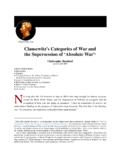

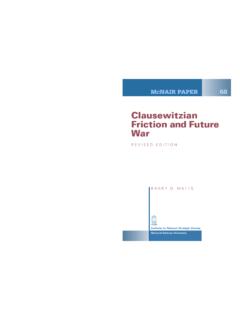

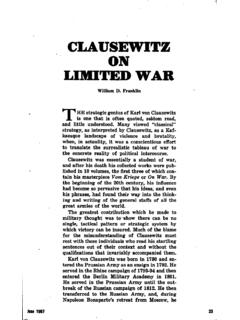
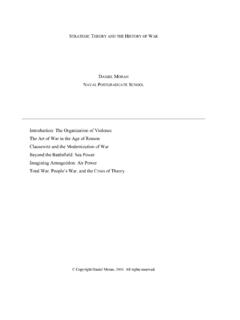
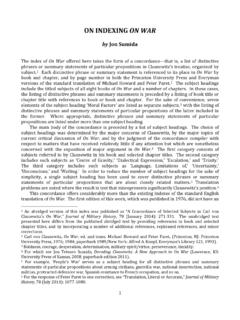



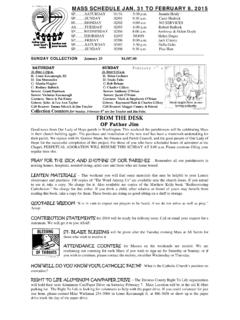
![Feast of James the Apostle[2] - …](/cache/preview/6/b/4/4/6/8/e/6/thumb-6b4468e6890ddafb339c56e4978d9183.jpg)

